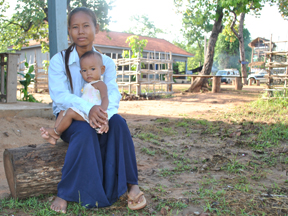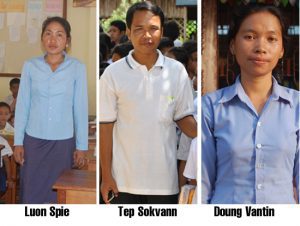In the Cambodian School System, there are “official teachers” who have finished grade 12 and had two years of University. These teachers are allowed to work both morning and afternoon sessions, enabling them to make some semblance of a living. In the urban areas, such as in Siem Reap proper, they can do private tutoring in order to augment the pittance they earn teaching at public school. In the countryside, things are much different.

Sok Srei Mao, teacher at Koh Ker School where the teachers have no access to University study
Trained teachers want to live in town, where they have access to children whose parents can pay for tutoring. In the countryside, the parents can often not even afford to send their children to school at all, much less engage teachers in private classes.
This means that in the countryside, where 80% of Cambodia’s population lives, there is a shortage of trained teachers. So, the government allows “volunteer teachers” to teach one session (half the day). These teachers are typically paid $200 a year in one lump sum at the end of the year. They only need to have completed grade 9 to teach in primary school and are not required to have been trained to teach. The cumulative effect of coupling untrained teachers with schools that are ill equipped and poorly attended keeps rural children from gaining access to the opportunities in life that come from meaningful education. This concern is at the core of the PLF’s mission.
This year the PLF will make a strong commitment to teacher training. The schools we support in these rural areas are full of these volunteer teachers and the thing we like about them is that they are from these villages. They are the neighbors and families of the students. They have a vested interest in the improvement of the children and it shows in their commitment, attendance and motivation. We also have a vested interest in them as we now have over 2,000 children under their direct tutelage.
The Ministry of Education has recently partnered with a new University in Siem Reap called CUS, that is offering, through this “scholarship program” two year degrees to rural teachers at select schools. Three teachers from Tchey have been asked to come to school. The program pays for all their expenses at school except $170 (over the course of the two years) . They will continue teaching as they pursue their degrees, with classes being held all day Saturday and Sunday and some weeknights. The big obstacle for them is transportation into Siem Reap for classes. We are estimating that transport costs will outweigh this small amount for tuition at about $200 per year.
Imagine being able to get a teaching certificate for $570! Here, it’s possible, at least for these three teachers. We hope that when you think about donating, about what is sustainable and what is not, that you’ll agree with us that investing in our khmer teachers is about the most productive thing a dollar could ever be asked to do. We can put however many clean white shirts we want to on our students, load them up with as many pencils, pens and exercise books as we want to, but that’s all money in the pit if the teachers are not up to task.
If that makes a lot of sense to you, help us support these teachers as they pursue their degrees.
About the Teachers
These three teachers teach at Tchey School. All three teach the khmer curriculum. Mr. Sokvan also teaches English and is the head of the English Program at Tchey.

Luon Spie, at left, has been teaching for 8 years since 2002. She has completed grade 12 and has a high school diploma. Spie is 31 years old and is single. She is from the Svay village, one of the three villages that Tchey school serves.
Tep Sokvann, center, has been teaching since 2003. He finished grade 12 and holds a high school diploma. He is from the Kamphem village, Puok District, also served by Tchey School. Mr. Sokvan is 32 years old and is married with one small child.
Doung Vantin, at right, has been teaching for 4 years since 2006. She holds a high school diploma and is not married. She is 24 years old and from Kampong Tayorng village, Puok District, not far from Chey village.
Let’s get this done!

Recent Comments